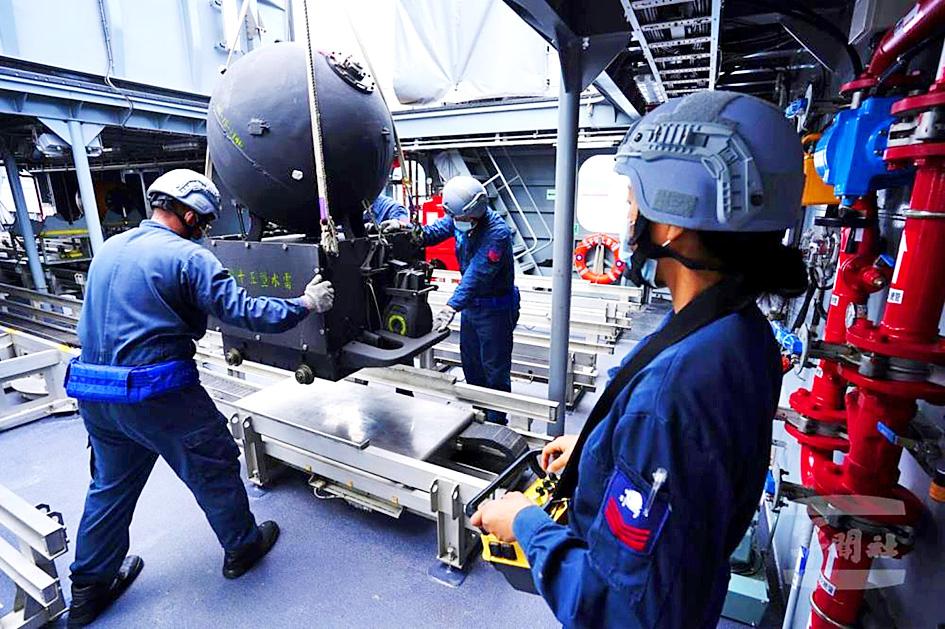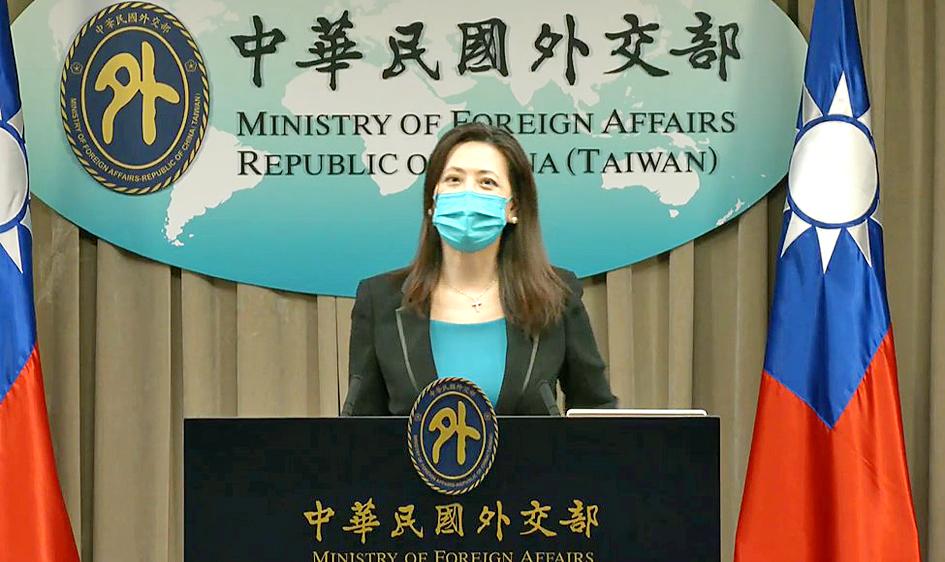China’s sovereignty claim over the Taiwan Strait is false, the Ministry of Foreign Affairs said yesterday, adding that the only waters a country has full sovereignty over are the 12 nautical miles (22km) around its territory.
Ministry spokeswoman Joanne Ou (歐江安) reiterated that the government considers the Taiwan Strait to be international waters, except for the 12-nautical-mile strip defined as territorial waters.
“Our government has always respected any activity conducted by foreign vessels in the Taiwan Strait that is allowed under international law,” she said, including US vessels passing through.

Photo courtesy of the Military News Agency
“We understand and support the freedom of navigation operations conducted by the US, as these operations promote peace and stability in the region,” she said.
Ou accused Beijing of “distorting international law” in ignoring Taipei’s 12-nautical-mile sovereignty claim in the Taiwan Strait, and said that by downgrading the Strait to its own exclusive economic zone (EEZ), China “revealed its ambition to annex Taiwan.”
Taiwan would continue to work with like-minded countries to uphold a rules-based international order, and promote peace and stability in the Indo-Pacific region, she added.

Photo: Lu Yi-hsuan, Taipei Times
On Monday, Chinese Ministry of Foreign Affairs spokesman Wang Wenbin (汪文斌) said that Beijing had sovereign and administrative rights to the Taiwan Strait, and denied US claims that the channel should be treated as international waters.
Wang claimed that the waterway fell within China’s territorial waters and EEZ as defined by the UN Convention on the Law of the Sea (UNCLOS) and domestic law.
“China enjoys sovereign rights and jurisdiction over the Taiwan Strait, while respecting the legitimate rights of other countries in the relevant maritime areas,” Wang said in Beijing. “There is no such thing as ‘international waters’ in UNCLOS. By claiming that the Taiwan Strait is international waters, some countries intend to create an excuse for its manipulation of the Taiwan issue, and threaten China’s sovereignty and security.”
UNCLOS states that countries can claim waters within 12 nautical miles of their coastline as territorial seas, where they have full sovereignty.
They can also claim the waters within 200 nautical miles of their coastline as an EEZ, where they have a sovereign right to the water column, sea floor and resources, but other countries still have the right to sail through or fly over the waters.
Most of the Taiwan Strait is less than 200 nautical miles wide, resulting in overlapping EEZ claims by Taiwan and China in the waterway.
Although UNCLOS does not define “international waters,” it does define “high seas” as referring to waters that are beyond the territorial sea or to areas outside EEZs that do not belong to any state’s jurisdiction.
The Democratic Progressive Party yesterday issued a news release condemning the Chinese statements as baseless and attempting to unilaterally upset the “status quo.”
The Chinese statement is a declaration of its expansionist ambitions, attempting to contravene Taiwan’s sovereignty, disrupt the international maritime order, and disrupt regional peace and stability, it said.
China should not live in its own world and push a baseless claim, the party said, calling for the Chinese Communist Party to halt its actions before it causes irreparable harm.
US-based China affairs analyst Ian Easton told the Central News Agency that the Chinese government and military are “increasing their long-term campaign of coercion against Taiwan, and they plan to be even more provocative in the future.”
“In my view, it is time for the US to step up and do more to support regional security. A US Navy ship visit to Taiwan, public visits from high-level American officials and bilateral US-Taiwan defense drills are all long overdue,” he wrote in an e-mail.
Additional reporting by Chen Yun

CHAOS: Iranians took to the streets playing celebratory music after reports of Khamenei’s death on Saturday, while mourners also gathered in Tehran yesterday Iranian Supreme Leader Ayatollah Ali Khamenei was killed in a major attack on Iran launched by Israel and the US, throwing the future of the Islamic republic into doubt and raising the risk of regional instability. Iranian state television and the state-run IRNA news agency announced the 86-year-old’s death early yesterday. US President Donald Trump said it gave Iranians their “greatest chance” to “take back” their country. The announcements came after a joint US and Israeli aerial bombardment that targeted Iranian military and governmental sites. Trump said the “heavy and pinpoint bombing” would continue through the week or as long

TRUST: The KMT said it respected the US’ timing and considerations, and hoped it would continue to honor its commitments to helping Taiwan bolster its defenses and deterrence US President Donald Trump is delaying a multibillion-dollar arms sale to Taiwan to ensure his visit to Beijing is successful, a New York Times report said. The weapons sales package has stalled in the US Department of State, the report said, citing US officials it did not identify. The White House has told agencies not to push forward ahead of Trump’s meeting with Chinese President Xi Jinping (習近平), it said. The two last month held a phone call to discuss trade and geopolitical flashpoints ahead of the summit. Xi raised the Taiwan issue and urged the US to handle arms sales to

State-run CPC Corp, Taiwan (CPC, 台灣中油) yesterday said that it had confirmed on Saturday night with its liquefied natural gas (LNG) and crude oil suppliers that shipments are proceeding as scheduled and that domestic supplies remain unaffected. The CPC yesterday announced the gasoline and diesel prices will rise by NT$0.2 and NT$0.4 per liter, respectively, starting Monday, citing Middle East tensions and blizzards in the eastern United States. CPC also iterated it has been reducing the proportion of crude oil imports from the Middle East and diversifying its supply sources in the past few years in response to geopolitical risks, expanding

Pro-democracy media tycoon Jimmy Lai’s (黎智英) fraud conviction and prison sentence were yesterday overturned by a Hong Kong court, in a surprise legal decision that comes soon after Lai was jailed for 20 years on a separate national security charge. Judges Jeremy Poon (潘兆初), Anthea Pang (彭寶琴) and Derek Pang (彭偉昌) said in the judgement that they allowed the appeal from Lai, and another defendant in the case, to proceed, as a lower court judge had “erred.” “The Court of Appeal gave them leave to appeal against their conviction, allowed their appeals, quashed the convictions and set aside the sentences,” the judges